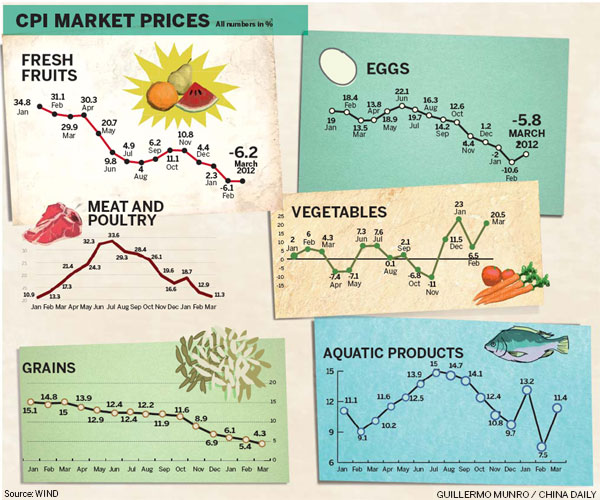 |
|
|
|
|||||||||

Rising prices hit low-income families the hardest as food costs surge 7.5%
Shoppers in Shanghai are feeling the heat from rising prices, particularly those on lower incomes.
In E-Mart, a supermarket in central Shanghai, many shoppers were seeking out cheaper cooking oil on Monday morning, after television reports on Sunday night forecast it would go up in price.
Shen Amei, 76, who cooks for a family of five, chose a 5-liter bottle of sunflower oil costing 55.9 yuan ($8.9).
"I have never tried this brand. I used to buy Arowana, or Fulinmen, which are well-known brands, but both are too expensive now," she said, noting that the price of a 5-liter bottle of cooking oil had risen by about 10 yuan.
Traditional Shanghai cuisine requires plenty of cooking oil and soy sauce to give food a rich and strong taste.
Although she prefers to cook this way, Shen said she may have to change in order to save money.
Shen said she only buys cooking oil when there is a discounted, and will then purchase two or three bottles.
China's consumer price index, a main gauge of inflation, rose 3.6 percent year-on-year in March, the National Bureau of Statistics said on Monday.
Food prices, which account for nearly one-third of the weighting in the calculation of China's CPI, increased 7.5 percent last month from a year earlier.
A 67-year-old retiree surnamed Wu said she and her husband have a monthly retirement pension of more than 5,000 yuan, which is enough for the couple.
But for elderly people on monthly pensions about around 2,000 yuan a month, the rising price of cooking oil means a lot, Wu said.
She added that her daughter-in-law's parents, on a monthly pension of 2,000 yuan, were finding it increasingly tough to make ends meet.
The elderly are not the only people unsettled by rising prices.
Young parents are concerned about the effects of recent price hikes.
Zhang Yanmin, 29, the mother of an 8-month girl, said that she was "surprised" by the leap in the price of Eastwes Rice Noodles, which she buys for her daughter, from 78 yuan last December to 98 yuan in February.
The Shanghai-based Oriental Morning Post said on Monday that, based on its research, the price of local bean products had risen by 10 percent, rapeseed and peanut oil products by 8 percent, and formula milk by up to 10 percent. And there is speculation that the consumer goods company giant Procter & Gamble Co may soon increase the prices of its shampoo in Shanghai.
CPI growth declined to 3.2 percent in February, the lowest pace in 20 months, but its expansion to 3.6 percent in March casts doubt on the government's ability to control inflation, according to analysts.
Ma Guangyuan, an economist with the Venture Capital Research Center of Peking University, said the "risk of an increase in inflation remains".
Increases in the price of consumer goods should be controlled, he said. Otherwise it will not only affect people's livelihoods, but also have a negative effect on the national economy, Ma added.
But some people do not share the prevailing view on price rises .
Valentina, 23, an Italian student at Shanghai International Studies University, said: "Prices are lower compared with those in my home country."
Deng Jin in Shanghai contributed to this story.
xieyu@chinadaily.com.cn